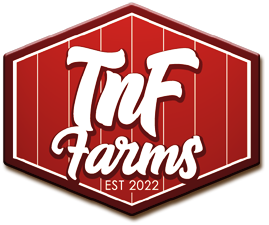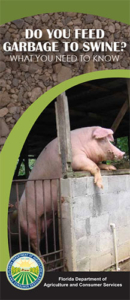Feeding pigs food waste or “garbage”
With the exception of my dad having his Rhode Island Red chickens, I did not grow up a farm kid. However I am familiar with the term “slop the pigs”. My interpretation of that phrase is you’re giving your pigs the leftovers or trimmings from meals prepared earlier in the day. The Florida Department of Agriculture has a series of publications to help out farmers getting started or experienced ones needing a refresher. This information pertains to Florida. Your state may have different regulations.
In the beginning stages for TnF Farms, we did investigate this very subject. Food waste, also classified in this publication as garbage is free. There’s plenty of food waste available and pigs are not picky eaters.
Ultimately, Tim and I decided against it because we did not want our livestock living on stale, processed and rotting food. Much today’s human population is overweight and not in the best of health. Diabetes, hypertension, and other food related disease is more common now and sadly these traits are creeping into the youth. Our decision to raise healthy, free ranging livestock was easy. Tim and I believe what’s wrong with everybody’s health is the GMO (genetically modified organism), tertiary processed and unnatural food that has become common now. Why put that very same junk food into an animal you’re going to process and eat?
Health aside, why the big deal?
Feeding of food waste, referred to as garbage, to swine in Florida is subject to strict regulations aimed at controlling the spread of disease. These regulations are in place to protect both public and animal health by ensuring that food waste is properly processed before being fed to swine.
Hog producers in Florida who wish to feed swine with garbage must obtain a state license. Then follow a set of rules and guidelines. These regulations require that all garbage intended for swine consumption must be thoroughly cooked to destroy disease-carrying organisms. The cooking process involves heating the waste to boiling (212°F or 100°C) for at least 30 minutes. Regular stirring to maintain a uniform temperature throughout the container.
What exactly is food waste?
The definition of garbage includes waste materials originating from the meat of animals, including fish and poultry, as well as other food-related trash. Notably, household cooking waste is exempt from these regulations and can be fed to swine on the same premises where it’s generated.
Proper cooking is essential to eliminate potentially harmful organisms that can be transmitted to animals and humans. There are two acceptable cooking methods. Direct fire heating, which involves stirring regularly. Or Steam injection, typically used by large-scale operations to ensure even heating of the garbage.
Obtaining food waste
The regulations cover various aspects of handling garbage, including obtaining it from approved sources such as grocery stores, restaurants, schools, or prisons. Importantly, hog producers cannot get garbage from others or give garbage to anyone else. Hog producers must have the capacity to cook it on their own property.
Moreover, the rules stipulate the use of leak-proof containers for storing and transporting garbage. The cleaning and disinfection of vehicles and equipment used with uncooked garbage. Maintaining records related to the collection, transportation, and delivery of garbage. Regular inspections are carried out by state officials to ensure compliance, and failure to adhere to the rules can lead to swine quarantine, loss of the license, and potential fines.
These regulations surrounding the feeding of garbage to swine in Florida are designed to protect public and animal health. Ensuring that garbage is properly cooked to eliminate disease-carrying organisms. These rules cover everything from cooking methods to container requirements, source of garbage, and inspection procedures. Compliance with these regulations is crucial for hog producers who choose to feed their swine with food waste.
Further information
Click here to download the most current version of this publication.
If you’re buying pork from a supermarket or grocery store, those pigs were probably not fed an optimum, natural diet. Commercially raised pork, even if labeled “grass fed”, “grass finished” or “organic” has probably been grown as cheaply as possible. Try to source your meats from your local farmer for optimum quality. Ask questions about their practices in raising their pigs. Remember the saying, garbage in, garbage out.



